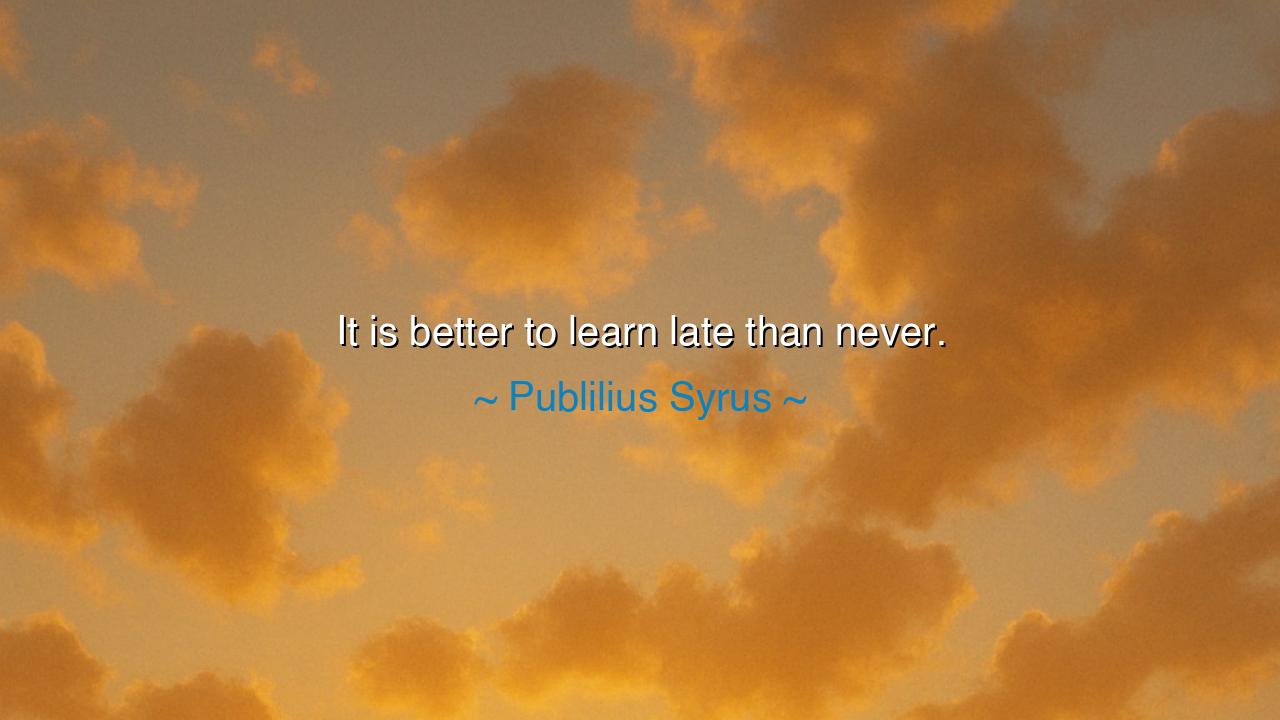
It is better to learn late than never.






“It is better to learn late than never.” – Publilius Syrus
Listen well, O seeker of truth, for these words come from the heart of ancient Rome, spoken by Publilius Syrus, a man born a slave yet freed by his wisdom and wit. His teachings were carved not in marble, but in memory—short lines of eternal insight that have outlived empires. Among them stands this enduring truth: “It is better to learn late than never.” Though simple in form, it carries the weight of ages. It reminds us that time may be a stern teacher, yet it will always welcome the humble student.
There are those who despair because they have awakened late to wisdom—those who cry, “It is too late for me.” But this saying rebukes such hopelessness. To learn late is still to learn; to see at last is still to see. For what greater tragedy can there be than a soul that never seeks understanding at all? The universe does not scorn the one who arrives breathless and behind; it only pities the one who never began the journey. Knowledge, like dawn, will greet any who lift their eyes, no matter how long they have slept through the night.
Think, for example, of Cato the Elder, the Roman statesman, who began to study Greek at the age when most men had long abandoned study. When asked why he would start learning so late in life, he replied, “It is better to learn now than to remain ignorant forever.” His name endures in the annals of time, not because of his conquests, but because of his unyielding pursuit of wisdom. He proved that learning knows no age, and that to grow wiser in one’s final days is nobler than to die content in folly.
So too in every age we find those who rise from darkness into light, though the years have weighed upon them. Consider Nelson Mandela, who learned forgiveness after twenty-seven years in prison. Many would have said, “It is too late.” Yet from the furnace of suffering he learned the greatest lesson of all—that freedom of spirit is greater than chains of the body. His late learning became the world’s salvation. For every truth learned, however delayed, ripples outward into eternity.
To learn late is not a sign of weakness; it is the mark of awakening. The heart that admits its ignorance opens itself to transformation. The proud man who refuses to learn remains imprisoned by his own arrogance, while the humble, even in old age, grows as green as springtime. There is no shame in coming late to wisdom; the only shame is to never arrive. For the soil of the heart is fertile until the last breath, and even an old tree may bear fruit when touched by light.
Let this saying guide you in all your days: never believe it is too late to change, too late to grow, too late to understand. Begin where you are, with what you have, and with as much courage as your heart can hold. The slow learner who persists will surpass the quick who quits. The mountain honors not the speed of the climber, but the strength of his resolve.
In your own life, if you find that wisdom has come to you late, greet it as a long-lost friend. Do not lament the years wasted, but rejoice that they were not wasted forever. Every new understanding, however delayed, redeems the past and reshapes the future. It is better to learn late than never, for in learning—even in the final hour—we reclaim what was lost and renew the flame of life itself.
So, my child of tomorrow, learn without fear and without pride. Learn in youth, learn in age, learn even in sorrow. For every truth discovered, no matter how long delayed, is a victory over the darkness of ignorance. Time may flee, but wisdom waits for all who seek it.






AAdministratorAdministrator
Welcome, honored guests. Please leave a comment, we will respond soon